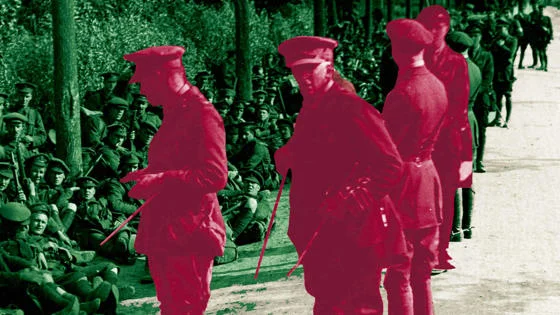Are we in danger of over-romanticising the military?

Contents
A legacy of the Vietnam war, the popular slogan "support the troops" was, initially, an attempt by the Johnson and later the Nixon administration, to counter the growing traction of the Vietnam-era peace movement.
The phrase came to be associated with redressing the widely held, though contested, belief that Vietnam veterans were betrayed by an ungrateful population at home, who had either forgotten or vilified them.
Today the slogan is used more generally to indicate support for the military and can be found on ribbons, t-shirts, bumper stickers and more.
"It’s the idea that that supporting the troops is something you can practice in your daily life, that it is just a normal part of being an American," explains Dr Katharine Millar, Assistant Professor in the Department of International Relations at LSE, who has recently published her book, Support the Troops: military obligation, gender, and the making of political community.
People were publicly reinforcing their support for the troops while the wars they were fighting were very unpopular.
Tabloid framing and the romanticisation of "our boys"
In the UK, with its smaller military and distinct history, the idea of supporting the troops is still present, suggests Dr Millar, but manifests differently. In 2000, the Ministry of Defence introduced the Armed Forces Covenant, which is described as, "a promise by the nation ensuring that those who serve or who have served in the armed forces, and their families, are treated fairly".
Similar notions can be seen, for instance, in affectionate references to "our boys", the increased prominence of the armed forces on TV and in popular culture, as well as the tabloid newspaper The Sun’s long-standing relationship with the charity Help for Heroes and the inception of an annual Armed Forces Day in 2009.
"This romanticisation of the relationship between the British public and the military is extremely similar to the sentiment driving the idea of ’supporting the troops’, no matter what, narrative in the US," says Dr Millar. "It’s a shift from focusing on honouring the military, and veterans, primarily for their sacrifices in previous wars – the messaging frequently associated with British Legion campaigns – to a valorisation of the military for, in essence, being the military. The emphasis on peace, and solemnly remembering wars with the aim of preventing them, has somewhat faded".
Supporting the troops doesn’t have to mean supporting the war
The "support the troops" slogan gained considerable traction in the first Gulf War in the 1990s and continued to be popular throughout the "Global War on Terror" and the associated conflicts in Iraq and Afghanistan. This was in spite of these wars being highly contested, and eventually broadly unpopular, with the public.
"I found it really interesting that people were publicly reinforcing their support for the troops while the wars they were fighting were very unpopular", says Dr Millar. "In fact, in the cases of Iraq and Afghanistan, there was a good chance that the person saying ‘support the troops’ actually opposed the war.
"It’s interesting that when most people hear me make this point, they tend to respond by saying something along the lines of ‘what else did you expect people to do?’ Supporting the troops, even – or mostly – in unpopular wars, is really normalised."
We [have seen] a move towards civilians publicising and recognising members of the armed forces because war is no longer a shared experience.
What happens when we don’t all serve in the military any more?
It’s this apparent contradiction that drove Dr Millar’s research in this area. Her analysis considers written and spoken materials related to the idea of "supporting the troops" produced by governments, media, and non-governmental organisations in the US and UK between 2001 and 2010.
She argues that a key to understanding this incongruity is through recent changes to the way liberal democracies make war. While in the past many Western liberal countries have had either conscription and a relatively recent experience of an existential war − during which everyone in the country felt its effects − today few citizens serve in the armed forces or have direct knowledge of conflict.
"There’s something about the way that citizenship and military service and war are set up in liberal democracies that creates the question for citizens, ‘What happens when we don’t all serve in the military any more?’", says Dr Millar. "Because whether or not you agree with particular wars, our societies have a deeply ingrained idea that everyone – previously ‘all good men’ and now everyone who aspires to be a ‘good citizen’, a ‘good person’ - should serve in the military in wartime. But, we don’t. So, what does that mean? How do we make that right? How do we hang together as a people?
"I argue that in response to this, we see a move towards civilians publicising and recognising members of the armed forces because war is no longer a shared experience. And, as a result, previous models of good masculinity, and citizenship, seem to be less attainable for the average person.
"‘Supporting the troops’ is a way of demonstrating good citizenship through the expression of masculine gender norms, while also allowing individuals to re-access those gender norms through good citizenship, rather than by going to war themselves."
This emphasis on the troops sucks all the air out of discussing the legitimacy of wars and it apoliticises collective violence in a way that we should worry about in a democracy.
Democracy and the troops
However, for Dr Millar, this has problematic consequences.
"The language and emotion of supporting the troops puts the violence associated with war second and the troops first and foremost. They’re framed as people who require our support rather than agents of state warfare. And so the main ethical question of war shifts from the harms being perpetuated to people – civilians – in the theatre of conflict and is instead about whether the troops are being properly supported," she explains.
"It also tends to short-circuit the relationship between democracy and the armed forces, as people are positioned first and foremost as supporters, rather than citizens involved in the democratic process through which wars are authorised and continued".
This raises the tricky question of whether, in fact, we should "support the troops."
"On the basis of the analysis in my book, I suggest that this emphasis on the troops sucks all the air out of discussing the legitimacy of wars and it apoliticises collective violence in a way that we should worry about in a democracy," says Dr Millar.
"Citizens should and need to be able to engage in a potentially contentious but legitimate public and political discussion about the ethics of war without being accused of betraying members of the armed forces or discredited as simply bad people – something that often happens in these kinds of debates."
Moving past the rote patriotism of the "supporting the troops" trope, Dr Millar emphasises, does not require disregarding veterans or serving members of the armed forces or their families.
Instead, she suggests, "One way to tackle this would be to start considering ‘the troops’ as citizens, once again embedded in broader society and thinking about how their needs fit into, and may be served by, larger reforms of social, health and welfare services and education.
Dr Millar says, "De-exceptionalising the military in this way would be a step towards society being able to have a more meaningful conversation about the politics of war."
Dr Katharine Millar was speaking to Sue Windebank, Senior Media Relations Manager at LSE.
Download a PDF version of this article




